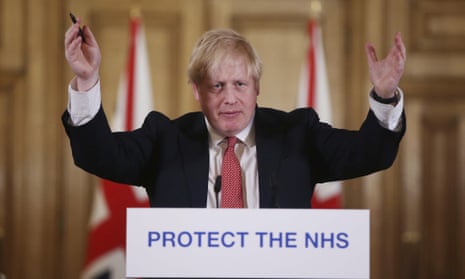Twelve years ago, I attended a conference on public health where a leading expert on pandemics introduced his talk by saying: “My task is to tell you things you don’t want to know, and ask you to spend money you haven’t got on something you don’t think will happen.” He then went on to describe, in considerable detail, a scenario for a global pandemic that was eerily similar to the one we’re currently experiencing.
Fast-forward more than a decade, and it seems the UK government was badly prepared for the coronavirus pandemic. It’s not as if we didn’t have prior warning that an event like this was a threat. Though Exercise Cygnus of 2016 remains shrouded in mystery, the government’s national risk register of civil emergencies has long put pandemics at the top of the list of risks the UK faces. In the 2017 register, a virus symbol sits in the top right-hand corner of a diagram of likelihood versus consequences. The UK’s strategy for managing a pandemic, meanwhile, was first published in 2011. But by 2014, government attention had turned away from pandemic preparation and back to counter-terrorism planning. And by 2016, planners in the UK were fully engaged in confronting the supply-chain disaster that would be Brexit, struggling to figure out how, for example, to boost the UK’s coffee supply.
Britain is experienced in planning for pandemics – so where is the emergency management of coronavirus? What we know so far about committees such as the scientific advisory group for emergencies (Sage) is that they appear to include no independent advisers on emergency planning and management. Expertise in medicine, virology, epidemiology, statistics and global health are all represented. So are behavioural sciences and psychology. Yet there seems to be a prevailing sense that the coronavirus crisis is primarily a medical and epidemiological problem – and that other aspects are mere fallout.
This is not exactly true. Modelling the transmission of the virus, researching a vaccine and procuring antiviral therapies are of course vitally important. But there is more to the coronavirus crisis than flattening its curve. The measures to contain the virus are relatively simple – physical distancing, testing, tracing and isolation – but they are laden with consequences, both for society and for individuals. Anticipating these effects and finding ways to mitigate them are the keystone of emergency planning.
The coronavirus crisis is complicated by the fact we are living in a highly interconnected world, where one event can have a ripple effect across the networks on which we all depend. Halting international travel, for example, has left food producers without seasonal migrant workers to harvest crops. But the arrival of seasonal workers from abroad in the future could lead to a second spike of infections, particularly if they live in close proximity to one another. The issue of a second spike has already proved an issue in Singapore, previously lauded for its response to the virus. These are among the types of issues that emergency planners need to consider.
Early attempts to deal with the crisis in the UK involved minimising its significance to the public and frantically improvising in a vain attempt to catch up with the spread of the virus. If plans existed, there was an abyss between the decisions mandated by the government and the reality of how they played out on the ground. This underlines the fact that emergency planning must be a live effort. Reality does not stand still – so neither must the plans for dealing with an emergency. Planners should be able to foresee urgent needs and prioritise them, providing enough personal protective equipment to the care homes that have become hotspots for the virus, for example, and knowing in advance how to source such equipment in adequate quantities.
Numerous academics have presented fairly detailed scenarios for an influenza pandemic since 2008, which covered many of the social, economic and public health consequences that we are now experiencing. But we still don’t have a clear idea about the recovery process, and what actions the government should take to help society and the economy to recover. Although we can look back to the 1918-1920 flu pandemic for an idea of how long this recovery process might take – and the challenges that this period will present – it’s difficult to apply this knowledge to the current crisis when so much has changed.
Emergency planning isn’t rocket science, but it’s distinctly challenging on many levels, involving intellectual, scientific and practical decisions. Wherever an event can be foreseen, the plans should be based on a range of scenarios. Planning scenarios aren’t predictions of the future but rather systematic explorations of hypothetical situations, answering the question: “What if…?”
When disasters strike there should be three elements to the response: plans, procedures and improvisation. We can imagine the planner as an orchestral conductor, directing the members of the orchestra to play their sheet music. It’s the conductor’s job to ensure the musicians play in harmony, and although improvisation can’t be eliminated, it should be reduced to a bare minimum. Emergency planners will be needed to identify and meet the novel challenges that coronavirus presents – both now and in the future. Never have they been needed more on critical advisory committees.
